Rio Olympics 2016: Judo champ Kelmendi thrills Kosovo
- Published
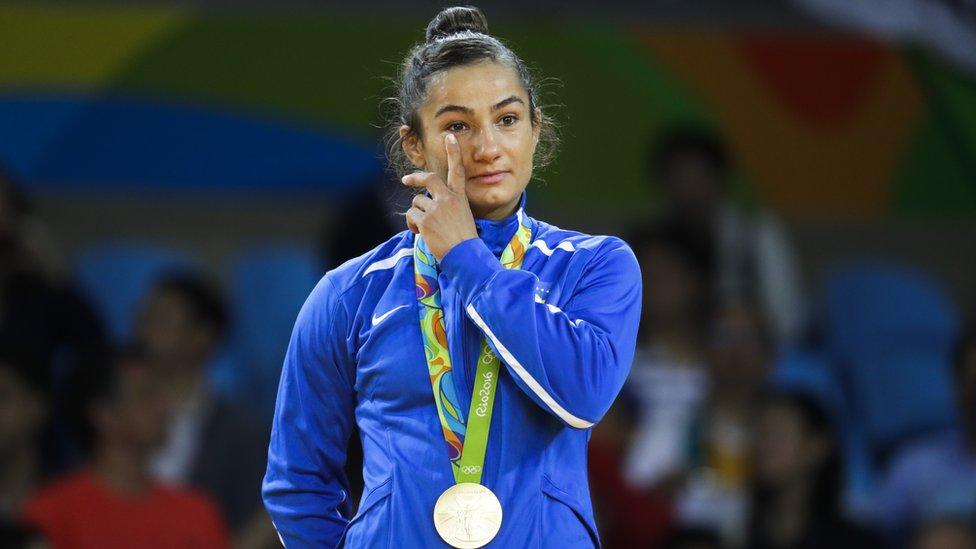
Kelmendi's victory was a popular success in Rio on Sunday
When Majlinda Kelmendi sank to her knees in tears at the Olympics on Sunday, it was more than the typical gold medallist's release of tension. It was also a defining moment for Kosovo's 1.8 million people.
Eight years after its unilateral declaration of independence from Serbia, Kosovo has its first Olympic champion and its flag has been raised on the biggest sporting stage.
Clearly emotional, Kelmendi, 25, said that even though her country was small and poor, she had proved that it was strong.
"People, especially kids in Kosovo, look at me as a hero," she said. "I've just proved to them that even after the war, even that we have survived the war, if they want something they can have it. If they want to be Olympic champions they can be."
She carried Kosovo's flag during the opening ceremony at Rio and was always favourite to win the women's judo 52kg title.
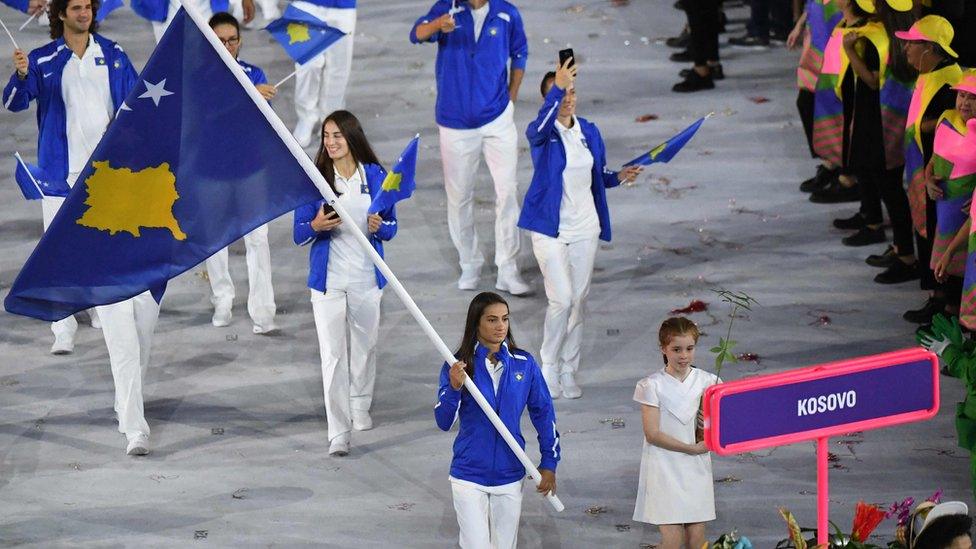
Kelmendi led a team of eight Kosovo athletes at the opening ceremony
She is after all a double world champion judo player - rated as the best in any weight category in 2014 - and recently reclaimed her European title, after injuries prevented her from competing for much of 2015.
"It was a hard year, but I came back good," she told the BBC before the Olympics, at a training session in the hills above her home town, Pec (known as Peja among the ethnic-Albanian residents).
'I want to show the world we can be equal'
Yet this wasn't Majlinda's first time at the Olympics. In London, she represented Albania but did not make it through to the medal rounds.
"In London I was good enough - prepared and strong. But I thought too much about what people would say if I won or lost."

'Historic Majlinda' - euphoria in Pristina
The Kelmendi family greeted the gold medal with singing and dancing, according to Kosova.info, external. Majlinda's father, Ismet, said they were all so proud, as was the entire Albanian nation. Koha Ditore labelled the judoka "historic Majlinda".
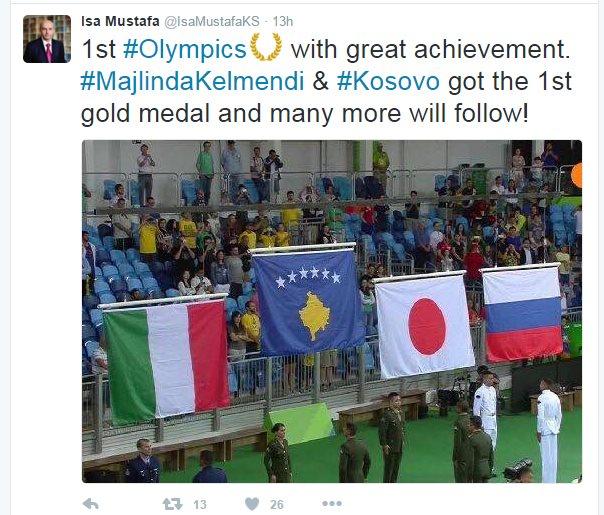
President Hashim Thaci said she had forged the Kosovo flag in gold "before millions of viewers worldwide" and Prime Minister Isa Mustafa said "Majlinda is gold, Kosovo is gold".
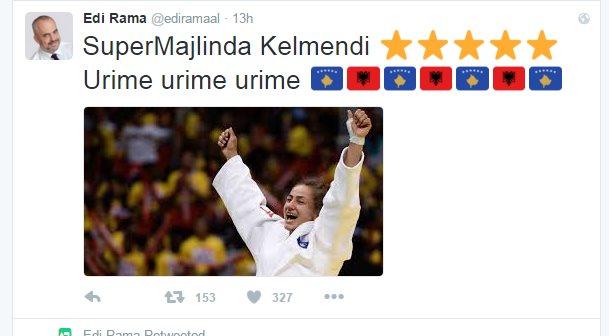
"Congratulations, congratulations, congratulations!" tweeted Albanian Prime Minister Edi Rama
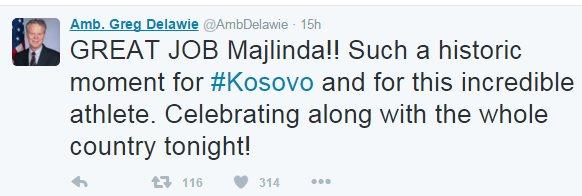
There was praise from the diplomatic community too, including the US ambassador

A gold medal at Kosovo's first Olympics not only puts a new republic on the map, it gives a big boost to Kosovo's small population.
Its independence remains unrecognised by more than 80 UN member states, including China, India, Russia and, indeed, the host nation of this year's Olympics.
Political campaign
Participation in Rio was only possible because the International Olympic Committee accepted Kosovo as a member at the end of 2014. That encouraged other sports governing bodies to follow suit - most recently Fifa and Uefa.
"We will use the results on the sports field to ensure that if we can have our flag in the Olympics we can have it in other things," Deputy Foreign Minister Petrit Selimi told the BBC ahead of the Games.
Sport plays a key role in Kosovo's political campaign and its leaders are pressing Brazil and other countries to recognise its independence.
Kosovo win first full international
Promotion through sport
The Republic of Kosovo's flag is at best a distant second-favourite for much of the population.
The black eagle of Albania is on display all over the capital, Pristina. On the other hand, the Serbian shield flutters defiantly in the ethnically divided town of Mitrovica.
And its unlovely design does little to inspire devotion. It looks like the diplomatic fudge it almost certainly was - an inoffensive shade of blue (Albanian red was out of the question), with a graphic representation of the country's borders (a warning against any future changes) and six stars (symbolising Kosovo's major ethnic groups).
And the absence of many of the other symbols of statehood - from an international dialling code to membership of the United Nations - has added to a sense that Kosovo is far from a fully-formed country.
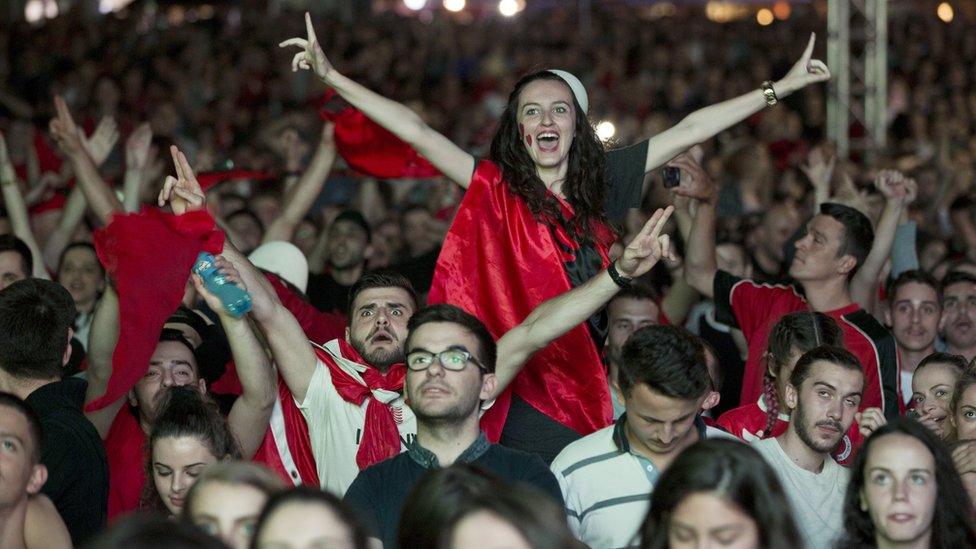
Kosovo Albanians cheered for Albania in the Euro 2016 football tournament
But sporting success, like Kelmendi's gold medal in Rio, could make all the difference.
"Recognitions have slowed significantly in recent years," says James Ker-Lindsay, senior research fellow on the politics of Southeast Europe at the London School of Economics. "In the absence of recognition at state level, one of the key ways to legitimise Kosovo is integrating it into international sporting organisations and events.
"A few years ago a diplomat said Belgrade will finally accept Kosovo as an independent state when it sees Kosovo playing football in the World Cup - and I think that's an accurate statement. By taking part in the World Cup and the Olympics, Kosovo is really cementing its place on the international stage."
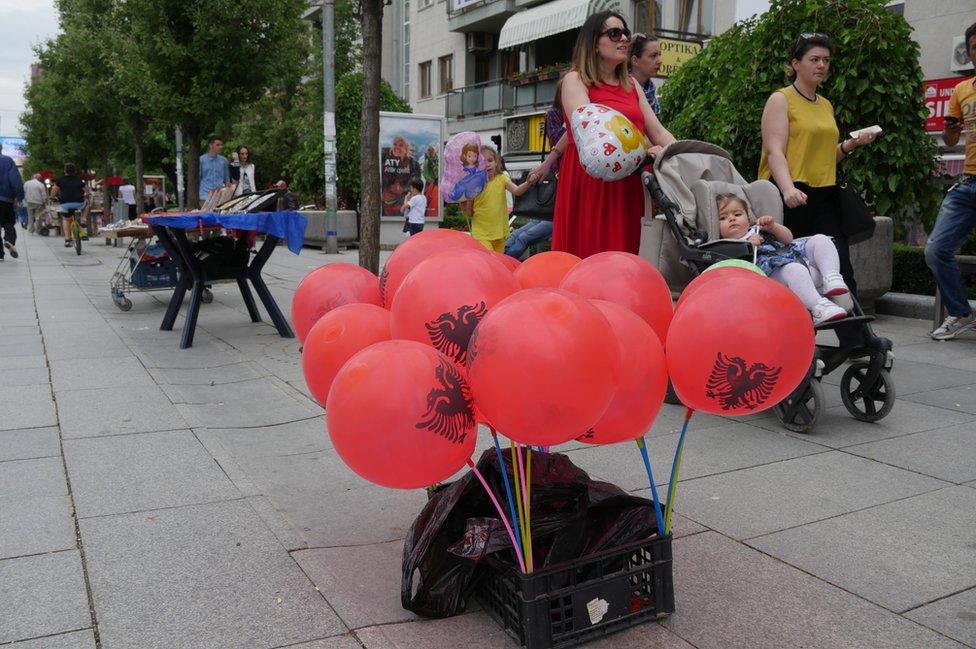
The Albanian flag takes the form of balloons in Kosovo's capital Pristina
'Healthy' patriotism
Could Majlinda Kelmendi's victory change how Kosovo is seen in the world?
Certainly it has prompted widespread euphoria in Kosovo, where hopes are high of a second judo medal.
Besa Luci, editor-in-chief of Kosovo 2.0 magazine, has been behind a campaign for sporting recognition called Kosovo Wants To Play. She says the opportunity to represent Kosovo is crucial to the country's health.
"Otherwise you're just paving the way for Albanian nationalist sentiment to grow.
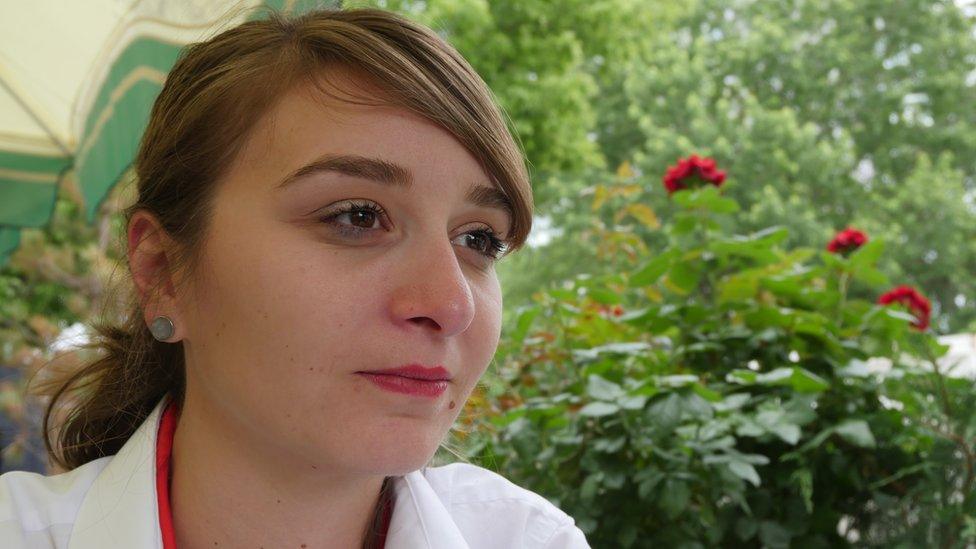
Besa Luci says international sport helps to improve citizens' rights
"The moment you have the opportunity to represent your country internationally, you will also start demanding more from your state. Ultimately it enables people to be citizens of a country, state, republic, where everyone should be treated equally. Sport has that kind of power."
And Kosovo's political leaders are keen to acknowledge the role played by the Olympic champion from Pec.
"Majlinda is a better ambassador than me and all the other diplomats combined," the deputy foreign minister said.